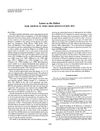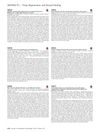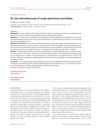 January 2024 in “Journal of tissue engineering”
January 2024 in “Journal of tissue engineering” Sunlight exposure damages hair follicles, but certain stem cell-derived particles can reduce this damage and help with hair regeneration.
 April 2016 in “Journal of Investigative Dermatology”
April 2016 in “Journal of Investigative Dermatology” The symposium showed that stem cells are key for understanding and treating skin diseases and for developing new skin models and therapies.
88 citations,
April 1981 in “Molecular and cellular biochemistry”  69 citations,
June 2017 in “Experimental Biology and Medicine”
69 citations,
June 2017 in “Experimental Biology and Medicine” Advanced human skin models improve drug development and could replace animal testing.
32 citations,
January 2017 in “Physiology & Behavior” New hair growth corticosterone levels are higher in diabetic mice, indicating long-term stress.
 28 citations,
March 2016 in “Toxicologic pathology”
28 citations,
March 2016 in “Toxicologic pathology” Dogs could be good models for studying human hair growth and hair loss.
 28 citations,
March 2010 in “Histochemistry and cell biology”
28 citations,
March 2010 in “Histochemistry and cell biology” Skin cells can help create early hair-like structures in lab cultures.
 25 citations,
August 1992 in “In vitro cellular & developmental biology”
25 citations,
August 1992 in “In vitro cellular & developmental biology” The new system can grow hair in the lab and test hair growth treatments.
 24 citations,
January 2008 in “KARGER eBooks”
24 citations,
January 2008 in “KARGER eBooks” The document concludes that ongoing research using animal models is crucial for better understanding and treating Alopecia Areata.
 8 citations,
August 2020 in “PLOS Computational Biology”
8 citations,
August 2020 in “PLOS Computational Biology” A machine learning model called CATNIP can predict new uses for existing drugs, like using antidepressants for Parkinson's disease and a thyroid cancer drug for diabetes.
 8 citations,
January 2019 in “Experimental Dermatology”
8 citations,
January 2019 in “Experimental Dermatology” The 3D skin model is better for hair growth research and testing treatments.
 5 citations,
January 2023 in “International Journal of Molecular Sciences”
5 citations,
January 2023 in “International Journal of Molecular Sciences” Hair follicles could be used to noninvasively monitor our body's internal clock and help identify risks for related diseases.
 5 citations,
September 2012 in “Journal of Investigative Dermatology”
5 citations,
September 2012 in “Journal of Investigative Dermatology” Scientists can mimic hair disorders by altering genes in lab-grown human hair follicles, but these follicles lack some features of natural ones.
3 citations,
March 2022 in “The journal of investigative dermatology/Journal of investigative dermatology” Zebrafish are useful for studying and developing treatments for human skin diseases.
 2 citations,
September 1980 in “Experientia”
2 citations,
September 1980 in “Experientia” Polyethylene alanine caused hair loss in young lab animals but not in adults, with hair regrowth occurring within 20 days.
1 citations,
January 2024 in “Microorganisms” Mice with a virus similar to COVID-19 had skin damage, but a special treatment helped repair it.
 1 citations,
January 2022 in “Stem cell biology and regenerative medicine”
1 citations,
January 2022 in “Stem cell biology and regenerative medicine” New methods to test hair growth treatments have been developed.
January 2020 in “Indian Journal of Pharmaceutical Sciences” Natural products show promise for new hair loss treatments.
 April 2018 in “The journal of investigative dermatology/Journal of investigative dermatology”
April 2018 in “The journal of investigative dermatology/Journal of investigative dermatology” Researchers created a 3D-printed skin model that grew human hair when grafted onto mice by improving blood supply to the grafts.
Deleting the MAD2L1 gene is tolerated in certain mouse cancer models.
 82 citations,
May 2009 in “BJCP. British journal of clinical pharmacology/British journal of clinical pharmacology”
82 citations,
May 2009 in “BJCP. British journal of clinical pharmacology/British journal of clinical pharmacology” Caffeine penetrates human skin in lab tests similarly to real-life conditions, but actual skin use is still essential for accurate results.
 31 citations,
May 2019 in “Nature communications”
31 citations,
May 2019 in “Nature communications” Single Blimp1+ cells can create functional sebaceous gland organoids in the lab.
 17 citations,
November 2013 in “American Journal of Primatology”
17 citations,
November 2013 in “American Journal of Primatology” Different monkey species in a lab showed varying levels of hair loss due to factors like type, sex, age, season, and living conditions.
 10 citations,
August 2022 in “International Journal of Molecular Sciences”
10 citations,
August 2022 in “International Journal of Molecular Sciences” Leptin-deficient mice, used as a model for Type 2 Diabetes, have delayed wound healing due to impaired contraction and other dysfunctional cellular responses.
 3 citations,
September 2013 in “Journal of the European Academy of Dermatology and Venereology”
3 citations,
September 2013 in “Journal of the European Academy of Dermatology and Venereology” Ex vivo dermatoscopy may lower lab costs and improve diagnosis speed for hair loss biopsies.
Deleting the MAD2L1 gene in mice led to rapid tumor growth despite chromosomal instability.
44 citations,
January 2012 in “Food and chemical toxicology” Ursolic acid can shrink the prostate and lower a hormone linked to prostate growth in rats.
 14 citations,
April 2011 in “Cell Proliferation”
14 citations,
April 2011 in “Cell Proliferation” Scientists can grow human hair follicle stem cells in a lab without changing their nature, which could help treat hair loss.
 April 2021 in “IntechOpen eBooks”
April 2021 in “IntechOpen eBooks” Androgens, male hormones, affect physical and mental functions, with a decrease leading to health issues like muscle loss, bone disease, and depression, and more research is needed on long-term effects and treatments.
 57 citations,
March 2013 in “Journal of Dermatological Science”
57 citations,
March 2013 in “Journal of Dermatological Science” Improving the environment and cell interactions is key for creating human hair in the lab.






















